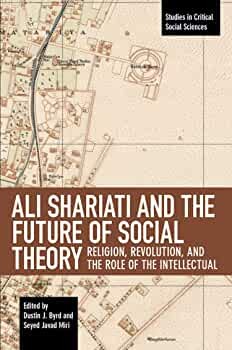Ali Shariati and the Future of Social Theory
Ali Shariati was an Iranian scholar and philosopher (1933-1977), argued to be one of the foremost intellectuals influencing the Iranian Revolution. Ali Shariati and the Future of Social Theory: Religion, Revolution, and the Role of the Intellectual (2017), edited by Byrd and Miri, revisits the ideas of Ali Shariati for contemporary and future of social sciences. The book is an edited collection (15 chapters), with contributions from a wide range of geographies and perspectives. Some notes:
"Shariati instead championed an enlightened and thus reinvigorated Islam that could govern itself, wherein Islam was the guide of the people and not their manager. This of course "radicalized" Islam, but not in the same way that is discussed when speaking of al-Qaʾeda, isis (daesh) and other terrorist groups – the false prophets of Islamism. Shariati radicalized Islam by a future oriented-return to its most radical roots, best exemplified by the sunnah (way) of Muhammad and his family, reacquainting the Muslim ummah with its original zeitgeist: a theologically oriented demand and revolt for social justice. In this way, Islam represented the universal longing for human emancipation, human flourishing and human solidarity, and rejected the particularity of the interests of the ruling elites" (p. 3)
"For Shariati, the exploitative sociology of Europe had realized that in order to be able to rob the East, to ride on her back, and to deceive her, it was imperative to strip her from her personality. Once this was accomplished, the East would proudly follow the West and, with unspeakable lunacy and thirst, would consume western goods. The exploiter, in this case the West, wanted to see his machines work all of the time. Furthermore, it wanted to see all originality, religion, tastes, and various talents destroyed, so that all races could be changed to become consumers of his products. In order to achieve this purpose, the exploiter searched for ways to deprive a nation of its personality, which was defined as the unique aspects of a culture that differentiates it from another. Therefore, a generation, like a tree, had to be severed from its roots so that it could be used and manipulated any way the exploiter wished." (p. 31-32)
"Shariati's epistemology posits that all knowledge is inherently value-laden relative to the universal ethics of Good and Evil which join existence in preceding essence. All knowledge must therefore be situated within the historical struggle between the religions of legitimation and revolution. Shariati thus advances an axiological epistemology that collapses Cartesian dualism without affirming a subjectivist, "anything-goes" ethical relativism. Methodologically, and consistent with the axiological anti-dualism of his epistemology, Shariati prescribes a methodology of critical hermeneutics. Because only God has universal knowledge of cause and effect, any attempts at unearthing an absolute semiotics is futile and impossible. Instead, Shariati argues that the only appropriate model for advancing human knowledge is the continuous interpretation of facts relative to their social construction and religious politics. Broken down into its constituent parts, Shariati's hermeneutical method involves 'objection, criticism, and the inner choice or selection of the individual.'" (p. 55)
"Shariati's ideas on religion and Islamic culture become clear in his correspondence with Franz Fanon. In his letter, Shariati expresses his disapproval and disagreement with Fanon over the essentiality of leaving religion in order for a nation to progress and conquer imperialism. He, instead, believes that a society must retain and regain its cultural and religious heritage as they can achieve the same ends. To him, religion, or more specifically the Islamic tradition, is the most powerful element for uniting the peoples and guiding them towards progressive objectives. Shariati cogently argues for the essentiality of a rediscovery of the national psyche before fighting the West. It is only with a domestic and an inherent ideology rooted in its own political culture that Iran can gain its respect by resisting imperialism." (p. 76)
"What Syed Hussein Alatas said of the mental captivity of intellectuals more than four decades ago still holds true, as the captive mind is real and pervasive in our society today. Trained almost entirely in the western sciences, the captive mind enjoys reading the western authors, and is educated primarily by western teachers, either in the West or through their available works in local institutions of education. Many of our intellectuals and university/college teachers read the works of western authors and teach them, yet they are not aware of this academic dependency, and those who are conscious of it do not bother to make an effort to change it. Our teachers use textbooks that are developed in countries very different than ours. They appear to have been total victims of the captive mind. Thus, Alatas' concept of captive mind resonates perfectly with the notions of mimicry and repetition that have been considered as one of the most effective strategies of colonial power and knowledge." (p. 79)
"In terms of educational methods, Shariati puts forward this pair of contrasting words: cultivation vs. instruction. According to him, the Islamic view puts cultivation at the center of education, whereas the western view takes instruction as the main vehicle for education. This is in parallel to the above-mentioned centrality of values in the curriculum adopted by Islamic education, and the centrality of knowledge in western education. According to Islamic education, in order to provide pupils with values, instruction is not enough, but living with pupils and dealing with their daily issues and giving them a role model is required." (p. 218)

